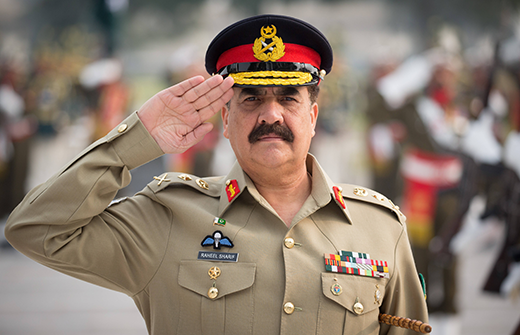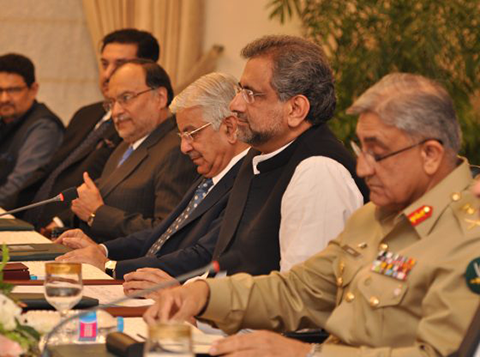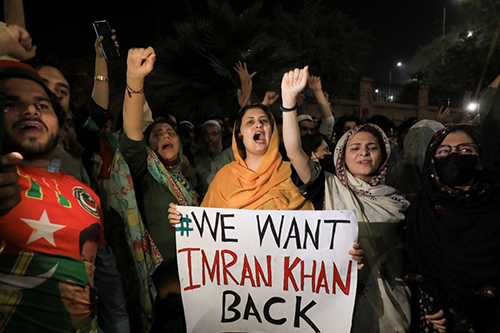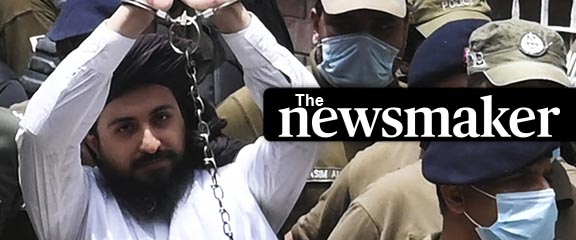General Qamar Javed Bajwa had an almost perfect start when he took over as Chief of Army Staff (COAS) in November 2016, but as his second three-year term draws to a close, challenges faced by the country and its mightiest institution – the Pakistan Army – appear graver than they were six years ago.
Today, Pakistan stands far more polarised and divided than it was in 2016, as a highly unpopular government is trying to run the show on the back of a disputed mandate and an incomplete National Assembly. And this is not a crisis of the government alone. The key state institutions – from the Parliament to the Election Commission of Pakistan and from the Pakistan Army to the superior judiciary — have all become controversial in one way or another.
Right now there appears to be a policy reversal on many fronts. There is US pressure on Pakistan to mend fences with India at the cost of Kashmir and resume trade relations with India. But this would be a highly unpopular policy change and hurt Pakistan’s core interests. The new military leadership must not allow this to happen
With the political landscape increasingly mired in a myriad of conspiracy theories, involving the political and military leadership, the challenge of terrorism is once again seen rearing its ugly head, particularly in parts of Balochistan and Khyber-Pakhtunkhwa provinces. This year, terror attacks on security forces have increased manifold. According to the Pakistan Institute for Conflict and Security Studies, 140 security forces’ personnel and 147 civilians were killed in the first seven months (January-July) of 2022, while 532 people, including 163 security personnel, were wounded during the same period.
Meanwhile, the Pakistan Army is confronted with an additional challenge: how to pull the institution out of the quagmire of controversies and revive its popular support base, which has taken a significant hit in recent months following the ouster of the Imran Khan government. Security analysts say that the new army chief will have a heavy agenda on his plate, given the grave political and economic flux and uncertainty in the country. General Bajwa, who in recent months launched many initiatives, now has hardly any time to see them through, including fulfilling his dream of bringing stability to the country.
According to Lt General (retired) Amjad Shoaib, General Bajwa will hang up his boots this November. “General Bajwa is determined to retire and won’t accept any extension,” he told Narratives Magazine. “He personally told me this in a meeting in the presence of some of his senior commanders… General Bajwa is clear that he won’t let the cycle of promotions and change be halted in the larger institutional interest.”
Director-General ISPR Major-General Babar Iftikhar had also announced in a press conference in January 2022 that General Bajwa would retire after completing his second term.
With media speculation now rife about who the new army chief will be, senior defence and security analysts in background interviews maintained that the biggest challenge for General Bajwa’s successor would be the extreme polarisation in society, which is also impacting the armed forces in different ways.
“Luckily for us, our armed forces are highly disciplined,” said General Shoaib. “The obedience of command is their core value.”
However, former senior military officers say that despite being a highly disciplined force, there remains an unease in the rank and file about the way an unpopular and controversial political leadership managed to wrest power through palace intrigues and form a hotchpotch coalition government.
“For the new chief, achieving equilibrium within the ranks, in the barracks and among the masses will be the foremost challenge,” said a retired general, requesting anonymity. “This means that he will have to quickly move to distance himself from some of the recent initiatives taken by General Bajwa.”
Lt. General (Retired) Ghulam Mustafa, a war veteran, who held a number of top command positions, agreed that the biggest challenge for the new chief would be ending the acute polarisation in society. “All the political parties are targeting the Pakistan Army in one way or the other,” he said. “They are also trying to weaken the institution of the army chief by making it controversial… directly targeting General Bajwa is not good for the country or the army, as not just the soldiers and officers, but also the general public look up to the office of the COAS. The new chief has to see how to restore that image.”
Former military officials say that the army draws its strength from the unity within its ranks. “It is like a family which has faith in its leadership,” said one officer who spoke on the condition of anonymity.
In November 2016, when General Raheel Sharif retired, the Pakistan Army was perhaps at the zenith of its popularity and an overwhelming number of Pakistanis saw it as the ultimate guardian of the country’s core national interests. The Pakistan Armed Forces had scored decisive victories in the war against terrorism through operation Zarb-e-Azb — launched in 2014. The Pakistan Army and its allied wings were seen as the bulwark against the greed, corruption and opportunism of many politicians in the elected government, though this was not the institution’s constitutional mandate.

The army as an institution also remained unyielding on Kashmir, despite efforts by the Nawaz Sharif government to put the issue on the backburner. The Pakistan Armed Forces’ hawkish stand on the country’s nuclear programme, their stand on overall relations with India, their management of the country’s western frontiers and their resistance to the undue pressure from the United States and its western allies, remained in sync with the aspirations of the majority of Pakistanis.
General Bajwa – as the face of the institution — successfully began his term of command from where General Raheel Sharif had left it. The launch of Operation Radd-ul Fassad in February 2017 expanded the ambit of the country’s anti-terror efforts across Pakistan, and managed to build on the success of General Sharif’s Zarb-e-Azb, which started in June 2014.
Under General Bajwa, the Pakistan Army’s image as an institution opposed to corruption, was bolstered by the manner in which it supported the Supreme Court of Pakistan in the Panama Case, which resulted in Nawaz Sharif’s ouster from power following his conviction in a corruption case.
The 2018 elections cemented the Pakistan Army’s popularity among the general public. By supporting the new government, it was seen as an institution that was serious about reforming Pakistan and holding the corrupt accountable.
Mainstream Pakistan appeared at ease with the fact that perhaps for the first time in recent history, both the civil and military institutions appeared to be working in tandem, which is vital for the stability of any country
While the mantra of the civil-military leaders being on the same-page gained currency, the opposition and its allied media coined the term ‘hybrid regime’ for the new political dispensation in an attempt to undermine the Imran Khan government. However, mainstream Pakistan appeared at ease with the fact that perhaps for the first time in recent history, both the civil and military institutions appeared to be working in tandem, which is vital for the stability of any country.
All this started to change toward the end of 2021, following the controversy about the appointment of the ISI chief. Nevertheless, both the civil and military leaders managed to keep the optics of unity in place for some time. But the controversial manner in which Imran Khan was removed from power in April this year through a no-confidence motion, and then replaced by individuals tainted with mega corruption scandals, triggered widespread public condemnation.

The Pakistan Army’s politically correct stance of “neutrality” may have been popular among a tiny segment of liberals and sub-nationalists, but for many common Pakistanis it was a step backward by an institution on which they relied the most. Many firm supporters of the Pakistan Army, who were also followers of Imran Khan’s Pakistan Tehreek-e-Insaf (PTI), saw it as handing over the country to the most corrupt politicians and their families.
General Ghulam Mustafa said that two bonds are critical for any army in the world. “The first, the rank and file’s relationship with its leadership, and second, the institution’s bond with the people.”
“In the 1965 War, the masses stood by the army and successfully warded off aggression by a far bigger enemy. But in 1971, the people in East Pakistan turned against us and the results of that are before us.”
He said the confidence in leadership is vital. “If confidence in the leadership is shaky, juniors will obey orders, but the level of enthusiasm will be low. They won’t put their heart and soul into the tasks at hand.”
Another lieutenant general, who had also held a couple of senior government positions, said the credibility of the army chief should be above board.
The Pakistan Army’s politically correct stance of “neutrality” may have been popular among a tiny segment of liberals and sub-nationalists, but for many common Pakistanis it was a step backward by an institution on which they relied the most
“The way the institution and its leadership has been made controversial in recent months has never happened in the past,” he said on condition of anonymity. “Everyone is now carrying a smartphone and they get affected by what is being said on the mainstream and social media. They get both, informed and misinformed. Therefore, restoring the trust of the leadership should be the number one task of the new chief.”
General Amjad Shoaib said the challenge of terrorism may reappear more forcefully as Maulana Fazlur Rehman, who is a partner in the ruling coalition, is unhappy with the merger of the former Federally Administrated Tribal Areas (FATA) in Khyber-Pakhtunkhawa. “He is demanding the scrapping of this merger. The Tehreek-e-Taliban Pakistan (TTP) also wants the same. If this happens, it would be a great leap backwards as General Raheel Sharif started pushing for it from the days of Nawaz Sharif.”
“If Maulana Fazl prevails, this means that the TTP has also prevailed. The gains which the army made after 14-15 years of hard work and sacrifices will be reversed because of political expediency. The new chief must ensure that this does not happen.”
One of the two generals, who spoke requesting anonymity, said that the new chief will have to bear in mind public sentiment, as well as that of the rank and file on the issue of occupied Kashmir and relations with India.
“Right now there appears to be a policy reversal on many fronts. There is US pressure on Pakistan to mend fences with India at the cost of Kashmir and resume trade relations with India. But this would be a highly unpopular policy change and hurt Pakistan’s core interests. The new military leadership must not allow this to happen.”

The former Imran Khan government had ruled out normal relations with India until it revoked the August 5, 2019 measure, which unilaterally made occupied Kashmir part of Indian territory. This is seen as the bare minimum Pakistan can do under these circumstances. Starting talks with India or restoring normal ties would mean that Pakistan has, to all practical purposes, accepted the new Indian position on Kashmir.
The country’s economic problems will also test the army’s leaders, as there will be pressure to cut down defence spending.
Last but not least is the anti-corruption narrative, regarding which many see a climbdown by the military during General Bajwa’s watch. Those accused of massive corruption have been allowed back in power, raising serious questions about Pakistan’s investigation, prosecution and judicial system. It also paints all the institutions in a bad light as they seem to have an acceptance of the corrupt.
This climbdown is highly unpopular, especially among the educated and professional upper-middle, middle and lower middle classes of Pakistan.
General Ghulam Mustafa said that ideally the new chief would also have to distance himself from politics, but the army is so entrenched that if it withdraws totally, it would create a vacuum. “You can’t suddenly withdraw and leave the space open for controversial forces. However, a gradual and organised distancing that is in line with the expectation of the masses would be better.”
“People are angry not just because Imran Khan has been removed, but even more so because those people who are known to be corrupt are back in power,” he said.
Against this backdrop, the new army chief will almost certainly have an extremely tough agenda in front of him in a highly charged and explosive political environment which will test both him and the institution to the hilt.



